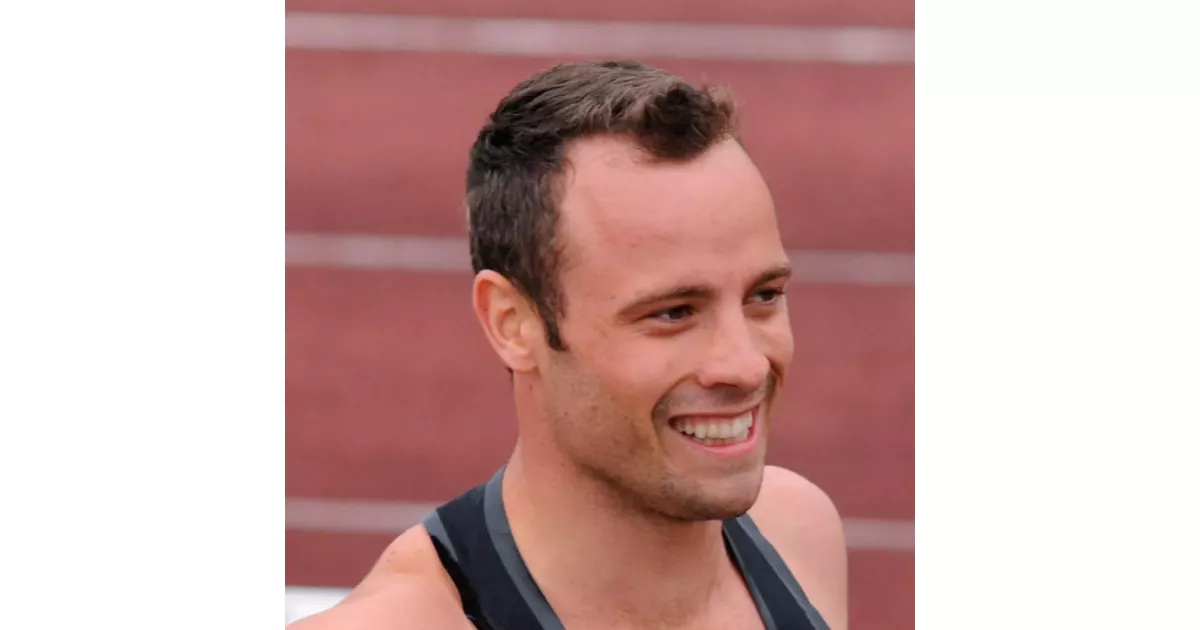Oscar Pistorius is a South African former professional sprinter who competed in both Paralympic and Olympic Games. He had both legs amputated below the knee as a child. Pistorius' career ended after he was convicted of murdering his girlfriend, Reeva Steenkamp. Initially convicted of culpable homicide, the conviction was later upgraded to murder upon appeal, resulting in a prison sentence.
November 1986: Oscar Pistorius Born
In November 1986, Oscar Leonard Carl Pistorius was born in Sandton, Johannesburg, South Africa, to Henke and Sheila Pistorius.
March 2002: Mother's Death
Oscar Pistorius' mother passed away on March 6, 2002. He has her birth and death dates tattooed on his arm in remembrance.
June 2003: Rugby Knee Injury
In June 2003, Oscar Pistorius suffered a serious rugby knee injury, which led to his introduction to running.
January 2004: Introduction to Running
In January 2004, Oscar Pistorius was introduced to running while undergoing rehabilitation for his knee injury at the University of Pretoria's High Performance Centre.
2004: Paralympic Bronze and Gold
In 2004, Oscar Pistorius competed in the Summer Paralympics in Athens, winning a bronze medal in the T44 100-metre event and a gold medal in the T44 200-metre event, setting a world record time.
July 2005: IAAF Grand Prix Invitation
In July 2005, Oscar Pistorius was invited to take part in his first international nondisabled event, the 400-metre race at the IAAF Grand Prix in Helsinki, Finland, but could not attend due to school commitments.
2005: South African Championships and Paralympic World Cup
In 2005, Oscar Pistorius finished sixth in the nondisabled South African Championships over 400 metres, and won gold in the 100 and 200 metres at the Paralympic World Cup.
2006: University Studies Began
In 2006, Oscar Pistorius began studying for a bachelor of commerce in business management with sports science at the University of Pretoria.
2006: Order of Ikhamanga Awarded
In 2006, Oscar Pistorius was conferred the Order of Ikhamanga in Bronze (OIB) by the President of South Africa, Thabo Mbeki, for outstanding achievement in sports.
2006: IPC Athletics World Championships Gold
In 2006, Oscar Pistorius won gold in the 100-, 200- and 400-metre events at the IPC Athletics World Championships, breaking the world record over 200 metres.
March 2007: 400m World Record
In March 2007, Oscar Pistorius set a disability sports world record for the 400 metres at the South African Senior Athletics Championships in Durban.
March 2007: IAAF Rule Amendment
In March 2007, the IAAF amended its competition rules to include a ban on the use of technical devices that provide an unfair advantage, which indirectly affected Oscar Pistorius.
April 2007: World Record Holder
In April 2007, Oscar Pistorius became the world record holder of the 100- and 200-metre events at the Nedbank Championships for the Physically Disabled in Johannesburg.
July 2007: Rome Golden Gala and British Grand Prix
In July 2007, Oscar Pistorius participated in the 400-metre race at Rome's Golden Gala and the Norwich Union British Grand Prix in Sheffield, preparing for potential Olympic qualification.
July 2007: IAAF Monitoring
In July 2007, the IAAF monitored Oscar Pistorius' track performances to determine whether his prosthetics gave him an unfair advantage, filming his races in Rome and Sheffield.
November 2007: Scientific Tests in Cologne
In November 2007, Oscar Pistorius underwent scientific tests at the German Sports University Cologne under Professor Peter Brüggemann, commissioned by the IAAF, to assess the energy efficiency of his prosthetic limbs.
December 2007: BBC Sports Award
In December 2007, Oscar Pistorius was awarded the BBC Sports Personality of the Year Helen Rollason Award for outstanding courage and achievement. This award was later revoked after his conviction for murder.
2007: Italian Autobiography Release
In 2007, Oscar Pistorius' autobiography, Dream Runner, was published in Italian with Gianni Merlo.
January 2008: IAAF Ineligibility Ruling
In January 2008, based on findings from the tests in Cologne, the IAAF ruled Oscar Pistorius' prostheses ineligible for use in competitions conducted under IAAF rules, including the 2008 Summer Olympic Games.
April 2008: CAS Appeal Hearing
In April 2008, Oscar Pistorius appealed the IAAF's decision to the Court of Arbitration for Sport (CAS) in Lausanne, Switzerland, appearing before the tribunal.
May 2008: CAS Appeal Upheld
In May 2008, CAS upheld Oscar Pistorius' appeal, revoking the IAAF council decision that deemed his prostheses ineligible, allowing him to compete in IAAF competitions.
May 2008: Time 100 List Inclusion
In May 2008, Oscar Pistorius was included in Time magazine's annual list of the world's most influential people, specifically in the "Heroes & Pioneers" section.
June 2008: University Interview
In June 2008, Oscar Pistorius gave an interview for his University's website, joking about his extended timeline for graduation due to his training commitments.
July 2008: IAAF Concerns and Legal Threats
In July 2008, IAAF general secretary Pierre Weiss expressed concerns about Oscar Pistorius's safety in the 4 × 400 metres relay, leading to Pistorius threatening legal action. The IAAF later clarified it had no objections to his participation.
July 2008: Olympic Qualifying Attempts
In July 2008, Oscar Pistorius competed in the 400 metres at the Notturna International in Milan and the Rome Golden Gala, attempting to achieve the Olympic qualifying time but falling short.
July 2008: Failed Olympic Qualification
In July 2008, Oscar Pistorius failed to qualify for the 400 metres at the 2008 Summer Olympic Games after coming third at the Spitzen Leichtathletik meeting in Lucerne, Switzerland. He missed the qualification by 0.70 seconds with a personal best time of 46.25 seconds.
2008: 200m First Place
In 2008, Oscar Pistorius achieved first place in the 200m race, further solidifying his reputation as a top athlete.
2008: Olympic Ambitions
In 2008, Oscar Pistorius aimed to compete at the Summer Olympic Games in Beijing but was not selected by the South African Olympic Committee.
2008: Olympic Qualification Attempt
In 2008, Oscar Pistorius aimed to qualify for the 2008 Summer Olympic Games in Beijing in the individual 400-metre race, needing to meet the Olympic "A" standard time.
2008: Music CD Collaboration and Charity Support
In 2008, Oscar Pistorius collaborated on the release of a music CD called Olympic Dream. He also supports the Mineseeker Foundation, a charity raising awareness for landmine victims and providing prostheses for survivors.
2008: Paralympic Success in Beijing
In 2008, Oscar Pistorius participated in the Summer Paralympics in Beijing, competing in the 100, 200, and 400 meters. He won gold in all three events, setting Paralympic records in the 100 and 200 meters and a world record in the 400 meters.
2008: 2008 Summer Paralympics Gold Medals
In 2008, Oscar Pistorius won gold medals at the Summer Paralympics in the 100m, 200m, and 400m (T44) events, marking a significant achievement in his career.
2008: English Autobiography Release
In 2008, Oscar Pistorius's autobiography, titled Blade Runner, was released in English.
February 2009: Boat Accident Injury
In February 2009, Oscar Pistorius was severely injured in a boat accident on the Vaal River near Johannesburg, requiring surgery for broken facial bones. This accident affected his training schedule for the year.
2010: Celebrity Survivor Appearance
In 2010, Oscar Pistorius appeared on L'isola dei famosi, the Italian version of Celebrity Survivor.
January 2011: IPC Athletics World Titles
In January 2011, Oscar Pistorius won three IPC Athletics World titles in New Zealand. However, he was defeated for the first time in seven years in the 100 meters by Jerome Singleton.
August 2011: World Championships Selection
In August 2011, Oscar Pistorius was selected for the South African team for the World Championships in Daegu, South Korea, participating in the 400-meter and 4 × 400-meter relay squad. He qualified for the semi-final in the 400 meters but was later eliminated.
2011: First Amputee to Win a Nondisabled World Track Medal
In 2011, Oscar Pistorius became the first amputee to win a nondisabled world track medal at the World Championships in Athletics, marking a milestone in his career.
2011: Olympic Qualification Mark Attained
In the summer of 2011, on July 19th specifically, Oscar Pistorius achieved a personal best of 45.07 seconds in the 400 meters at a meeting in Lignano, Italy. This time met the "A" standard qualification for both the World Championships and Olympic Games.
January 2012: Dancing with the Stars Appearance
On January 7, 2012, Oscar Pistorius made a guest appearance on the Italian version of Dancing with the Stars, called Ballando con le Stelle, in Rome, where he danced a tango.
February 2012: Laureus World Sports Award
In February 2012, Oscar Pistorius was awarded the Laureus World Sports Award for Sportsperson of the Year with a Disability for 2012, recognizing his achievements in sports.
July 2012: Olympic Team Inclusion
In July 2012, Oscar Pistorius was officially included in the South African Olympic team for the 400-meter and 4 × 400-meter relay races, marking a significant milestone in his career.
August 2012: Olympic Debut
In August 2012, at the Summer Olympic Games, Oscar Pistorius made history as the debut amputee runner to compete in the Olympics. He advanced to the semi-finals in the 400-meter race with a season's best time, but did not qualify for the final.
August 2012: Mural Unveiling in Gemona
On August 22, 2012, Oscar Pistorius was honored with the unveiling of a large mural depicting his achievements in the town of Gemona, Italy.
September 2012: IPC Award Nomination
In September 2012, Oscar Pistorius was shortlisted for the Whang Youn Dai Achievement Award by the IPC, recognizing his fairness, honesty, values, and promotion of the Paralympic Movement. He was nominated by an organization from South Korea, but the award was given to two other athletes.
October 2012: The Tonight Show Appearance
On October 9, 2012, Oscar Pistorius appeared on The Tonight Show with Jay Leno. He was also scheduled to appear on Piers Morgan Tonight and Larry King Now.
2012: Paralympics Flag Bearer and Competitor
In 2012, Oscar Pistorius carried the flag at the opening ceremony of the Summer Paralympics. He competed in the 100, 200, and 400 meters races, and the 4 × 100 meters relay.
2012: Sponsorship Deals
In 2012, Oscar Pistorius had sponsorship deals worth US$2 million a year with various companies including Össur, BT, Nike, Oakley, and Thierry Mugler. He also worked as a model in advertising campaigns.
2012: First Double-Leg Amputee in the Olympics
In 2012, Oscar Pistorius made history as the first double-leg amputee to participate in the Summer Olympics, achieving a significant personal and athletic milestone.
2012: 200 m World Record
In 2012, Oscar Pistorius set a world record in the 200m (T44) event with a time of 21.30 seconds, marking a pinnacle in his athletic achievements.
2012: Repeated on Time 100 List
In 2012, Oscar Pistorius was included on the Time 100 list again, solidifying his status as one of the world's most influential people.
2012: Honorary Doctorate Announced
In 2012, after the Summer Paralympics, the University of Strathclyde in Glasgow announced that it would confer an honorary doctorate on Oscar Pistorius.
February 2013: Shooting of Reeva Steenkamp
In February 2013, Oscar Pistorius shot and killed his girlfriend, Reeva Steenkamp, at his home in Pretoria, claiming he mistook her for an intruder. He was arrested and charged with murder.
March 2014: Murder Trial Begins
In March 2014, on March 3rd, Oscar Pistorius's murder trial began at the Pretoria High Court, concerning the shooting of Reeva Steenkamp.
May 2014: Trial Adjournment for Psychiatric Evaluation
In May 2014, on May 20th, the Oscar Pistorius trial was adjourned until June 30th to allow him to undergo psychiatric evaluation to determine his criminal responsibility for the shooting of Reeva Steenkamp.
June 2014: Silverwoods Estate House Sold
In June 2014, Oscar Pistorius's house in Silverwoods Country Estate, Pretoria was sold.
June 2014: Trial Resumes After Evaluation
In June 2014, on June 30th, Oscar Pistorius's trial resumed after psychiatric evaluation reports indicated he could be held criminally responsible for the shooting of Reeva Steenkamp.
October 2014: Culpable Homicide Conviction
In October 2014, Oscar Pistorius was found not guilty of murder but guilty of culpable homicide in the death of Reeva Steenkamp. He received a five-year prison sentence for culpable homicide and a concurrent three-year suspended sentence for reckless endangerment.
October 2014: Sentencing for Culpable Homicide
In October 2014, on October 21st, Oscar Pistorius was sentenced to a maximum of five years in prison for culpable homicide and received a concurrent three-year suspended sentence for reckless endangerment.
November 2014: Prosecutors apply to appeal culpable homicide verdict
In November 2014, prosecutors applied to the sentencing judge for permission to appeal the culpable homicide verdict, stating that the five-year prison term was "shockingly light, inappropriate and would not have been imposed by any reasonable court".
December 2014: Judge rules prosecution can challenge ruling
In December 2014, Judge Thokozile Masipa ruled that the prosecution could challenge her ruling of acquitting Pistorius of premeditated murder and convicting him of the lesser charge of culpable homicide; however she ruled that the state could not appeal the length of the sentence.
February 2015: Honorary Doctorate Revoked
In February 2015, the University of Strathclyde in Glasgow revoked the honorary doctorate they had previously conferred on Oscar Pistorius, following his conviction for culpable homicide.
June 2015: Recommended for Early Release
In June 2015, Oscar Pistorius was recommended for early release from prison, potentially as early as August, after serving a sixth of his sentence.
August 2015: Release to House Arrest Blocked and Then Announced
In August 2015, Oscar Pistorius's release to house arrest, initially set for August 21st, was unexpectedly blocked by South Africa's Justice Minister Michael Masutha, who deemed the parole board's decision "premature".
August 2015: Date set for prosecutors to submit court papers
In August 2015, the date for prosecutors to submit court papers outlining their arguments was set for August 17, 2015.
September 2015: Date set for defence team's response
In September 2015, the date for the defence team's response to the prosecutor's court papers was set for September 17, 2015.
October 2015: House Arrest and Appeal
In October 2015, Oscar Pistorius was temporarily released on house arrest while his case was presented on appeal regarding his conviction in the Reeva Steenkamp case.
October 2015: Released from Prison
On October 19, 2015, Oscar Pistorius was released from prison.
November 2015: Date set for appeal hearing
In November 2015, the date for the appeal hearing was set for November 2015.
November 2015: Pistorius found guilty of murder in appeal
On November 3, 2015, the Supreme Court of Appeal overturned Pistorius's culpable homicide conviction and found him guilty of murder in the death of Reeva Steenkamp.
December 2015: Pistorius to remain free on bail under house arrest
On December 8, 2015, it was announced Pistorius would continue to remain free on bail but under house arrest pending his appeal to the Constitutional Court.
2015: Convicted of Murder
In 2015, Oscar Pistorius' athletic career ended when he was convicted of murder for the death of Reeva Steenkamp, after an appeal upgraded his initial conviction of culpable homicide.
March 2016: Pistorius denied right to appeal, sentencing hearing scheduled
On March 3, 2016, it was announced Pistorius had been denied his right to appeal, and would next be due in court on June 13, 2016 to begin a five-day sentencing hearing for the murder conviction.
April 2016: Case referred back to trial court for sentencing hearing
In April 2016, the culpable homicide verdict was replaced with a murder conviction, and the case was referred back to the trial court for a sentencing hearing when it reconvened on April 18, 2016.
June 2016: Pistorius due in court for sentencing hearing
In June 2016, Pistorius was scheduled to appear in court on June 13, 2016 to begin a five-day sentencing hearing for the murder conviction, concluding on June 17, 2016.
June 2016: Sentencing adjourned until July
On June 15, 2016, the sentencing was adjourned by Judge Thokozile Masipa until July 6, 2016.
July 2016: Sentence Extended
In July 2016, Judge Thokozile Masipa extended Oscar Pistorius's sentence to six years following his conviction for the murder of Reeva Steenkamp.
July 2016: Sentencing adjourned until July
In July 2016, the sentencing was adjourned by Judge Thokozile Masipa until July 6, 2016.
July 2016: NPA to appeal 'shockingly lenient' sentence
On July 21, 2016, the National Prosecuting Authority (NPA) confirmed that it would appeal against Judge Thokozile Masipa's "shockingly lenient" 6-year jail sentence.
July 2016: Pistorius sentenced to six years' imprisonment
On July 6, 2016, Judge Thokozile Masipa sentenced Pistorius to six years' imprisonment for murder, rather than her original sentencing of five years' imprisonment for culpable homicide; once again he was incarcerated in the hospital wing at the Kgosi Mampuru II jail.
August 2016: Masipa rejects appeal bid
On August 26, 2016 the bid to appeal the sentence was rejected by Masipa, who said that the NPA had "no reasonable prospect of success" of securing a longer prison sentence for Pistorius.
August 2016: Pistorius treated for wrist injuries
On August 7, 2016, Pistorius was treated at Kalafong Hospital, in Pretoria, after sustaining minor injuries to his wrists after slipping in his cell.
September 2016: NPA to make fresh bid to extend jail sentence
On September 15, 2016, it was confirmed that the NPA would make a fresh bid to extend Pistorius's jail sentence and would file papers to the SCA on September 16. After this announcement, sources associated with Pistorius's family and the defence team accused Gerrie Nel and the NPA of pursuing a "personal vendetta" against Pistorius.
October 2016: Pistorius granted compassionate leave to attend grandmother's funeral
On October 14, 2016, Pistorius was briefly released from prison for four hours through a compassionate leave license to attend the funeral service of his grandmother, who died on October 8, 2016.
November 2016: Pistorius transferred to Atteridgeville Correctional Centre
In November 2016, Pistorius was transferred from the Kgosi Mampuru jail to Atteridgeville Correctional Centre, which is smaller and better adapted for disabled prisoners.
September 2017: SCA to hear arguments appealing to extend Pistorius's sentence
On September 19, 2017, it was confirmed that the SCA would hear the state's arguments appealing to extend Pistorius's sentence on November 3, 2017, with its final ruling being confirmed on November 24, 2017.
November 2017: Unofficial biopic airs on South African TV
An unofficial biopic based on public records titled Oscar Pistorius: Blade Runner Killer, was aired on November 18, 2017 on South African TV. The movie was made without the consent of either the Pistorius or Steenkamp families.
November 2017: SCA to hear arguments appealing to extend Pistorius's sentence
In November 2017, it was confirmed that the SCA would hear the state's arguments appealing to extend Pistorius's sentence on November 3, 2017, with its final ruling being confirmed on November 24, 2017.
November 2017: Pistorius's jail sentence increased to 13 years and five months
On November 24, 2017, the SCA increased Pistorius's jail sentence to 13 years and five months. Prosecutors had argued that the six-year term was too short.
December 2017: Pistorius files papers to appeal increased sentence
On December 19, 2017, it was confirmed that Pistorius had filed papers with the Constitutional Court to appeal the newly increased sentence and have his previous six-year sentence reinstated.
March 2018: Appeal dismissed by the courts
On March 28, 2018 the appeal was dismissed by the courts; Pistorius was not to be eligible for parole until at least 2023.
April 2018: Appeal dismissed by the courts
On April 9, 2018, it was confirmed that on March 28, 2018 the appeal was dismissed by the courts; Pistorius was not to be eligible for parole until at least 2023.
2018: Amazon Prime releases documentary series Pistorius
In 2018, Amazon Prime released a four-part documentary series on its video service titled Pistorius.
2019: Anticipated parole eligibility
It was anticipated that Pistorius would be eligible for release on parole, after serving three years of his sentence, in 2019.
2020: ESPN+ airs documentary series The Life and Trials of Oscar Pistorius
In 2020, A four-part documentary titled The Life and Trials of Oscar Pistorius aired on ESPN+.
March 2023: Parole denied after hearing
After an additional hearing, parole was again denied on March 31, 2023.
March 2023: Parole board to consider early release for Pistorius
In March 2023 it was announced that a parole board would consider an early release for Pistorius on March 31, despite his serving just half of his sentence. Pistorius' release was opposed by Barry and June Steenkamp, Reeva Steenkamp's parents.
November 2023: Pistorius to be released on parole
On November 24, 2023, it was announced that Pistorius was to be released on parole. Reeva Steenkamp's mother, June Steenkamp, did not oppose his parole.
January 2024: Pistorius Released on Parole
In January 2024, Oscar Pistorius was released on parole after serving 8.5 years in prison and 7 months of house arrest, marking a new phase after his conviction.
December 2029: Pistorius's sentence expires
Pistorius's sentence is set to expire on December 5, 2029.
Mentioned in this timeline

Amazon Prime is a subscription service offering a variety of...
New Zealand is an island country in the southwestern Pacific...

Piers Morgan is a British broadcaster journalist writer and media...
Africa is the second-largest and second-most populous continent comprising of...

Abu Dhabi is the capital city of the United Arab...
Korea is a peninsular region in East Asia comprised of...
Trending
49 seconds ago Falcons Secure Kyle Pitts with Franchise Tag, Ending 49ers Interest.
1 hour ago Fenerbahçe vs. Kas?mpa?a Match Live, Kante's Demand After Performance

1 hour ago Alycia Parks faces Oksana Selekhmeteva in the 2026 ATX Open First Round.
1 hour ago Aldi Frozen Meatballs Recalled Nationwide Due to Metal Fragment Contamination Risk
1 hour ago Social Security Payment Schedule Changes and Delays Explained for February and March 2026

1 hour ago Peter Mandelson arrested amid Epstein probe, facing misconduct accusations in the UK.
Popular

Jesse Jackson is an American civil rights activist politician and...

Barack Obama the th U S President - was the...

Bernie Sanders is a prominent American politician currently serving as...

Michael Joseph Jackson the King of Pop was a highly...
The Winter Olympic Games a major international multi-sport event held...

Michael Jordan widely considered one of basketball's greatest players significantly...
